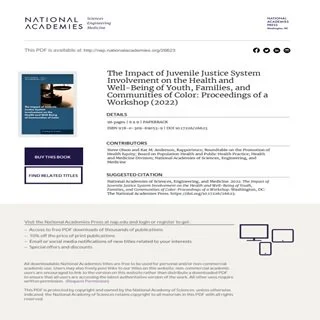By Steven Olson and Kat M. Anderson
On September 26, 2019, the Roundtable on the Promotion of Health Equity of the National Academies of Sciences, Engineering, and Medicine held a workshop in Flagstaff, Arizona, on the impact that juvenile justice system involvement has on the health and well-being of adolescents, families, and communities of color. The roundtable has a unique role as a convener of the nation’s experts in health disparities and health equity. It works to promote health equity and the elimination of health disparities by increasing the visibility and understanding of inequities in health and health care among racial and ethnic populations; examining research, policy, and community-centered programs; and catalyzing the emergence of new leaders, partners, and stakeholders. The Arizona workshop was the last in a series of three centered on the intersection of health equity with the criminal justice system. The first, held in Philadelphia, Pennsylvania, focused on incarceration as a structural determinant of health (NASEM, 2019). The second, held in Washington, DC, examined interactions between race, ethnicity, and drug control laws and policies and the criminal justice system (NASEM, 2022). The Arizona workshop featured panels of nationally and locally recognized experts in justice and health, along with a luncheon session featuring young adults speaking about their experiences in the justice system. As Julie Baldwin, director of the Center for Health Equity Research at Northern Arizona University and chair of the workshop planning committee, said during the workshop’s opening session, “We see this as a critical launching point for dialogue and action around this topic, both locally and nationally.”2 The workshop was sponsored by the Aetna Foundation, the Arizona Biomedical Research Centre, the California Wellness Foundation, The Colorado Trust, the Health Resources and Services Administration, the Hogg Foundation, Merck & Co., Inc., the Moore Foundation, the NARBHA Institute, Northern Arizona University Center for Health Equity Research, and the U.S. Department of Veterans Affairs’ Office of Health Equity.
National Academies of Sciences, Engineering, and Medicine. 2022. The Impact of Juvenile Justice System Involvement on the Health and Well-Being of Youth, Families, and Communities of Color: Proceedings of a Workshop. Washington, DC: The National Academies Press.





